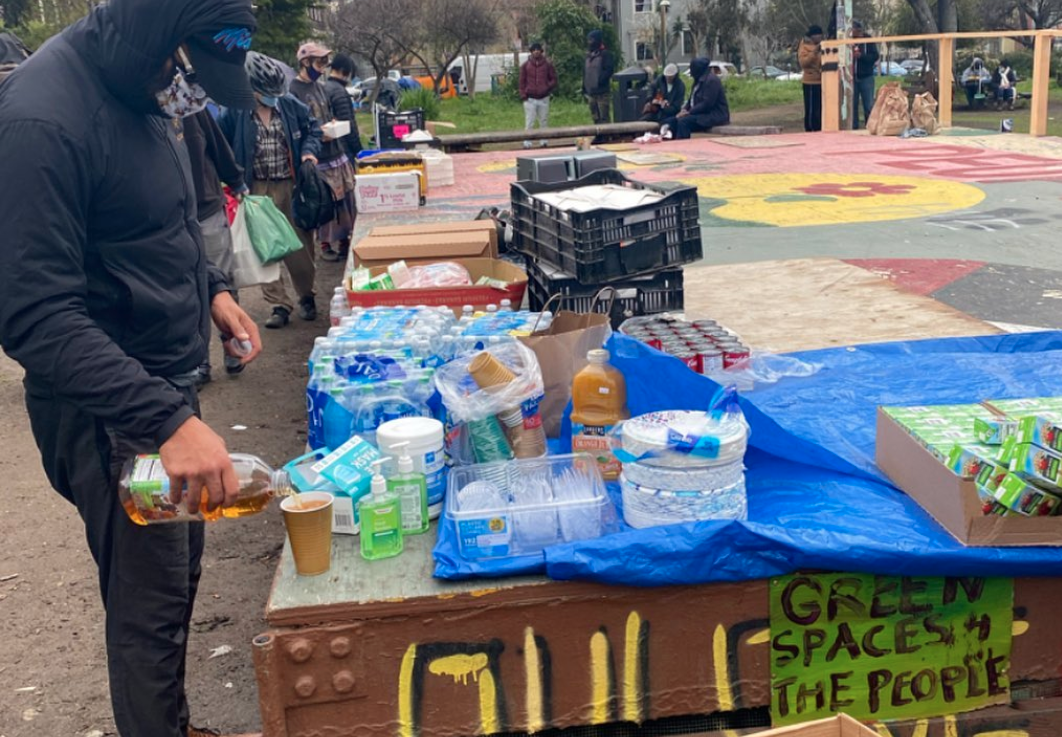

By Osvaldo Barba
BERKELEY–– Through grassroots advocacy, Berkeley Mutual Aid Project (BMAP), a newly founded student-run organization at UC Berkeley, seeks to provide aid to those in need. Since the beginning of the spring 2021 semester, BMAP has held several food distributions at the historic site of People’s Park.
The project was founded by Charles Paltzer, a freshman at the university. According to the project’s Instagram, @berkeleymap, his model of the organization is to follow that of Dean Spade, an Associated Professor of Law at Seattle University School of Law.
Drawing inspiration from Spade, Paltzer defines mutual aid as “a direct action to meet people’s immediate survival needs, through the recognition that the government has fallen short of providing these survival needs.”
In the words of one project member, who wished to remain anonymous, “mutual aid more than ever, demonstrates that it’s possible (and probable) to achieve tangible change without direct reliance on government or the administration.”
For many Berkeley students who feel disillusioned with existing power structures, BMAP and other similar organizations provide a means to directly aid communities.
Furthermore, a number of students who are part of the project expressed their enthusiasm and drive for a mutual network that refrains from having a formal power structure.
“The non-hierarchical nature of BMAP’s positions ensure that members are involved out of genuine passion rather than a desire for glory. Because the primary focus is on sustainable and intersectional aid rather than a resume boost, mutual aid projects can focus on change on the individual level (as opposed to other organizations which prioritize governmental action, often at the expense of other important goals),” said the anonymous source.
During COVID-19, mutual aid is more critical than ever, as unemployment rates and basic needs instability have spiked. While the government has passed a series of relief packages, the majority of Americans believe these measures are not sufficient enough to adequately combat pandemic-induced socioeconomic issues. Moreover, organizations that typically provide aid, such as shelters, are often not operating at full capacity due to coronavirus safety protocols.
Activist and UC Berkeley freshman Soumaya Lhamous stated that mutual aid “is generally more dependable than the promises of politicians and government entities whom we’ve seen fail to come through for their constituents in need time and time again [through] the pandemic.”
Furthering that concept, BMAP member Daniel Najera explained “mutual aid is extremely important during COVID-19 times because BIPOC and low-income people do not have the luxury or privilege to wait around for the government to take action and help people, through mutual aid people can help others in need through direct service by donating resources, supplies and/or money to those who need it.”
For UC Berkeley students, BMAP is an option to directly aid those in need. For the past several weeks, the project has organized weekly food distributions at People’s Park—the site of an ongoing dispute between campus administration and advocates for the unhoused.
These events have been entirely student-run, from the food collections to the distributions themselves. Each week, members ask their floormates and peers for excess water bottles and nonperishables, accumulating a significant amount of items. The distributions occur every Friday afternoon at People’s Park.
“Shared spaces and networks of care are created with the small support from many people! For any Berkeley students eating on campus, grab that extra water bottle during your next trip to [Crossroads] for our neighbors at People’s Park!” reads one post from BMAP’s Instagram.
Through urging students to help in whatever way they can, Paltzer and team hope to promote the conception that individual action can be extraordinarily effective.
While BMAP’s primary focus has been on food distribution so far, the organization hopes to tackle a host of other issues in the near future, including, but not limited to: basic needs in general (and how they have been impacted by the pandemic), housing instability in UC Berkeley, mental health of unhoused people, and equitable access to menstrual products.
According to Paltzer, “BMAP is a growing group of Berkeley students interested in participating in mutual aid.” Although it was recently founded, BMAP has already made significant accomplishments, following in the footsteps of other grassroots organizations at UC Berkeley, a campus long renowned for student activism.
Osvaldo Barba is a writer for The Vanguard at Berkeley’s social justice desk. He is a freshman studying Political Science at Cal. He is from Los Angeles, CA.
To sign up for our new newsletter – Everyday Injustice – https://tinyurl.com/yyultcf9
Support our work – to become a sustaining at $5 – $10- $25 per month hit the link:
